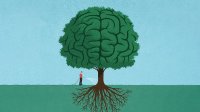Teacher Moves That Cultivate Learner Agency
Helping students become independent, questioning thinkers begins with stepping back and guiding them to take the lead in their learning.
Your content has been saved!
Go to My Saved Content.Cultivating learner agency is an endless journey. It not only entails knowing our students as human beings but also requires identifying and unlearning patterns in our teaching that unknowingly engender dependence in learners.
The term agency comes from the Latin agere, meaning “to set in motion.” It is precisely what agency should do in our classrooms: empower learners so that their minds and hearts become the engines that drive learning in our classrooms. This isn’t as simple as some might believe. Providing too much voice and choice without proper scaffolds can be counterproductive, resulting in chaos in the classroom.
Consider the following moves that cultivate learner agency—and choose one to try in your classroom.
Embrace the Quiet Moments
In an era of learning acceleration and learning loss, it can be hard to grant ourselves permission to slow down. But if we’re looking to cultivate learner agency, we must consider the negative effects of accelerating learning—of always asking our students to be “on” in our classrooms. We must ask ourselves: Where does the urgency come from, and how might it be disenfranchising some of my students?
That sense of urgency can actually cause us to diminish learner agency. I’ve certainly been there. When I’m feeling that sense of urgency, I can’t help but intervene prematurely, act on behalf of my students, and bear the majority of the cognitive load. But when I extend my wait time and embrace quiet moments that allow students to have opportunities to think on their own, my time investment pays off in large dividends, providing me with independent learners who find they have lots of tools to overcome obstacles on their own.
When we embrace these quiet moments, we bear witness to student process, which is perhaps the most personalized part of learning in our classrooms.
Praise Students’ Journeys
By stepping back and supporting our students while they productively struggle, we can learn a great deal about their learning habits, praising and coaching their efforts along the way.
Praising students’ journeys is a great place to start. But we must be specific in our positive feedback. We must name what our students are doing well in order to help them identify it for themselves. Otherwise, our classrooms become places full of empty compliments.
- “I can tell you’re seeking patterns,” I said to a student recently. “That is something good mathematicians do. You may not always find the patterns, but looking for them is a great idea.”
- “I know research can be frustrating and confusing,” I say to validate my students’ feelings when they engage in the research process. “Let’s talk about some ways to work through those feelings.”
Cultivate a Sense of Mastery
Daniel Pink, author of Drive, describes mastery not as unlocked achievements or boxes checked on a report card, but instead as a “desire to get better at something that matters.” In schools, this means cultivating awareness of how effort is connected to tangible progress.
After all, it makes intuitive sense: If we can see that the effort we’re putting into a task is helping us grow, we’re more likely to replicate those behaviors and persist through challenges. But it’s easier said than done.
Allow for Learner-Driven Evaluation
In order for students to evaluate their own work, they need to have the language to do so. Otherwise, students may nondescriptively refer to their work as “good” or “bad.” This means that educators must create structures, such as learner-friendly rubrics, that can provide them the language necessary to self-evaluate.
These learner-friendly rubrics should contain standards-based, student-friendly learning objectives, such as I can calculate the area and perimeter of rectangles. After evaluating their work on the rubrics, I recommend following up with a structured reflection, in which students state strengths, challenges, and action steps in their own words, as I detail in Reclaiming Personalized Learning: A Pedagogy for Restoring Equity and Humanity in Our Classrooms.
When first starting learner-driven evaluation, learners will need a lot of support. You may want to model how to reflect, even letting them borrow some of your language until they’re ready to do it on their own.
Ask Questions More Often Than You Provide Corrective Feedback
While providing specific and actionable feedback is helpful for productive learning, asking thoughtful questions can help students give themselves feedback, allowing them to tap into their own agency and initiate improvements to their work on their own.
Good questions will have multiple answers; they won’t lead students, either. Consider asking questions like “Why did you choose to…?” or “Is there a more efficient way to…?” This will force students to think about their thinking, adding a layer of agentive criticality to conversations.
When students are stuck, you may feel inclined to intervene directly in order to get them over their obstacles. But we must remember that if we, the teachers, are acting on behalf of students to help them overcome challenges, we may be doing more to diminish agency than we are cultivating it. In this instance, I like to ask students, “What tools do you have to help you get unstuck?”
Tell Students You Trust Them
This sounds simple, but it’s really powerful. By telling students that you trust them, you hand over responsibility to them, and you let them know that no matter what happens—even if they make a mistake—it’s all going to be OK.
But you have to walk the talk. It’s not enough to only tell students that you trust them. You have to show them, too, by embracing the aforementioned teacher moves that cultivate learner agency.
